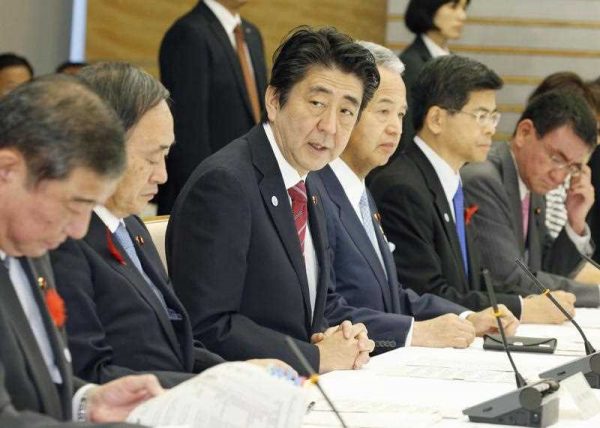First, despite expectations that the TPP will encourage structural reform of low-productivity industries such as agriculture, just how much of an impact the deal will have on the domestic farm sector is contestable.
Former official of the Ministry of Agriculture, Forestry and Fisheries (MAFF), Kazuhito Yamashita, argues that ‘there will be hardly any impact’ on rice. Tariffs will be maintained on rice imports. While the zero-tariff import quota for US and Australian rice will expand by 78,400 tonnes, the Japanese government will purchase the same amount of domestic rice for stockpiling, thus isolating it from the domestic market and preventing any falls in the domestic price.
Prime Minister Shinzo Abe committed himself to taking the necessary steps to ensure that ‘the total distributed amount of rice … does not increase’. The expanded government purchases will raise budget costs to 70–80 billion yen (US$580–670 million) and will block structural reform of the rice industry (as competition from rice imports will not increase). Consumers will not benefit from cheaper prices. In this way, the ‘Abe administration has been able to play both sides — proudly declaring to farmers that they “protected the [rice] sanctuary without abolishing tariffs” at the same time as expanding imports from the United States [and Australia]’.
Yamashita also argues that there will be little impact on beef and pork producers, although tariffs and duties on these products will either be reduced or abolished. Even if the price of beef drops after the tariff is reduced (from 38.5 to 9 per cent over 16 years), the existing beef calf production subsidy system will still be sufficient to insulate farmers from any impact.
Japan will maintain its complex gate price system for pork while the specific duty on cheap pork will fall from 482 yen per kilogram (US$4) to 50 yen (US$0.42), and the 4.3 per cent ad valorem duty on expensive pork will be abolished. But because importers mix high-priced parts with low-priced parts to minimise the duty they pay under the gate price system, abolishing the specific duty on cheap pork ‘will barely have any effect’.
Second, all indications are that the Abe administration — like previous Liberal Democratic Party (LDP) administrations — will cushion Japanese producers from the impact of any import liberalisation, which will help keep small-scale, inefficient farmers in business. The government is facing an upper house election in July 2016. The generally accepted view is that the LDP wants to put together appropriate measures to support farmers in order to secure votes and win the election in the face of adverse winds stemming from its security legislation.
For these reasons, the Abe administration was very keen to secure the TPP as a done deal in Atlanta. One veteran LDP Diet member observed that ‘we need a certain amount of time to quell the farmers’ worries [before the election]. The agreement was made just in the nick of time’.
Abe has committed himself to establishing a TPP taskforce, consisting of all cabinet members, in order to minimise the TPP’s impact on domestic agriculture and other domestic industries. At its first meeting he stated: ‘We will compile thoroughgoing domestic countermeasures, including policies to strengthen agriculture’s competitive power’.
A MAFF briefing to representatives of producer and food industry groups also emphasised the government’s plan to compile ‘thoroughgoing countermeasures’. The Central Union of Agricultural Cooperatives under its new chairman, Choe Okuno, lost no time in posting a statement on its website on the ‘need to prepare thoroughgoing measures including legislation aimed at ensuring the “reproduction” [of sensitive products] … and appropriate budget measures’. The government’s plan is to secure approval of these domestic measures before the proposal to ratify the TPP is submitted to the Diet.
The new MAFF minister’s appointment is another clue to the government’s political strategy and policy intentions. Prime Minister Abe has chosen one of the leading ‘insider’ members of Japan’s agriculture and forestry ‘tribe’, Hiroshi Moriyama, for this role. Moriyama was one of the key players in securing a commitment from the Abe administration to maintain tariffs on the ‘five sensitive items’ in the TPP negotiations (rice, wheat and barley, beef and pork, dairy products and sugar). He led the fight against the TPP from within the LDP, chairing all the important formal party and informal Diet members’ groups on the issue.
Moriyama’s appointment is a deliberate move by the Abe administration to head off any political repercussions from the farm sector. It will let farmers know that they can expect a bounty of benefits to ‘compensate’ them for any negative impact on their incomes. Farmers have strong faith in Moriyama as their representative and his task will be to work on domestic measures.
Following the Japan–Australia Economic Partnership Agreement, Moriyama, as chairman of the LDP’s Agriculture, Forestry and Fisheries Trade Affairs Committee, promised farmers that the government would ‘establish measures to guarantee reproduction’, leading the debate on legislating special measures for stabilising beef cattle fattening management (code for subsidies and other policy concessions).
The Abe administration wants to heal any rift between itself and farmers over successive waves of ‘reforms’, including those to the agricultural cooperative organisation. It is hoping that Moriyama’s close connections to the rice roots will help to gain farmers’ understanding in the lead-up to the upper house election in July 2016.
Aurelia George Mulgan is a professor at the University of New South Wales, Canberra.

